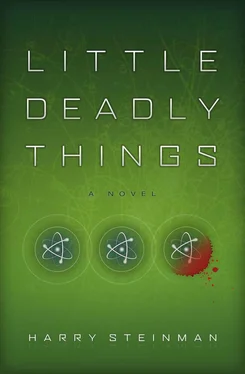She took in Jim’s neat piles of old-fashioned books and data-plaques. They were stacked on every available surface except Jim’s small desk, bare save for a coffee service. Eva touched her datasleeve and launched a snooper application to search for key words, terms, and algorithms on the chance that any of Marta’s work would be on Jim’s datapillar. In the time that it took the handler to complete his morning duties, Eva sifted through Jim’s pillar in an unsuccessful search. Her frown was a brief departure from her normal expressionless demeanor.
When Jim reappeared, he was covered in dog hair. Leashes hung around his neck like leather boas. He looked drained. He shuffled to his desk and brewed coffee. “Ah, sweet elixir of life,” he said with his first sip and offered a cup to Eva who shook her head impatiently.
“Anybody ever tell you that you’re full of crap?” Eva asked without rancor.
“Only you, darling.”
Eva stood very still. She cocked her head, heard sounds within her that grew and threatened to drown out the sounds around her. She blinked hard, forcing a moment’s quiet, and when she could hear again, she said, “Now it’s darling?”
“Eva, you could charm the skin off a snake. Wouldn’t you rather have a lifetime friend?”
Eva said nothing. The inner din quieted.
Jim gave no sign that he’d observed her distress. He lifted his cup in a toast to his old friend. “You never do anything without a purpose. And to wait without complaint? What’s up?”
Eva looked at Jim. “I’ve got a problem. My project at Harvard produced two medicines—”
“Your project?—”
“—Okay, our project at Harvard produced two medicines that Plant Lady extracted from her rainforest. We showed that they could be built in a nanoassembler. I turned that project into NMech. I damned near went broke building an assembler that could be implanted in a patient’s body. Getting FDA approvals was murder. But we’re making a little money now.”
“You’ve got working internal assemblers?”
“Didn’t I just say so?”
The old manufacturing paradigm, whether for medicine or metals, was to whittle larger hunks of material into smaller ones. Nanotechnology, the science of matter at a scale so small as to be nearly unimaginable, permitted products to be built up, molecule by molecule. Eva’s company focused on synthesizing drugs using this technology.
“Congratulations” Jim said. “So, what’s the problem?”
Eva said, “Control. Let’s say that you implant a nanoscale assembler inside a patient’s body. It fabricates and dispenses the meds automatically. But you need to be able to raise or lower the dosage to match the patient’s condition. We need to control the assembler after it’s been implanted.”
“An assembler at sub-cutaneous scale? That’s science fiction, stuff of the future. What am I missing?”
“Everyone seems to think that progress is fantasy—until they get their nose rubbed in it. About one-hundred years ago, movie producer Darryl Zanuck predicted the end of television. Twenty years later? The world watched the first moon walk on their televisions. Trust me, I know exactly how to build a nanoassembler, and make it small enough to be implanted. What I need is control.”
“Control is old hat,” said Jim. “Doctors have had wireless control over drug implants for years.”
Eva interrupted. “The problem with wireless control is the physician. Too busy to keep track. And the patients? They’re worse. They skip appointments to recalibrate the implants. But if I could control nanoagents remotely? A Boston administrator manages a Berlin patient’s prescription? If I can control the dosage from a datapillar, I can make the system efficient.”
“You mean, you can control the cure.”
“Don’t get high-and-mighty with me. The system now means that physicians have to do a technician’s job. Not fair to the doctor, not fair to the patient. But NMech has the medical skill and the technological know-how to manage the dosage remotely.”
“Eva,” Jim said gently, “she wants to practice medicine, not be a drug manufacturer. You know that.”
“Let me finish. I have a proposal that she will like, if remote control is feasible.”
Jim said nothing for a few moments, then subvocalized. His lips moved but he pronounced his words silently. A skin-toned comm-patch seated on his cheek registered the minute vibrations in his jaw and throat from the silent speech and converted the resonance into electronic pulses, and then sent a series of commands to his datasleeve. The sleeve activated a heads-up holographic display. Jim peered into the projection for a few minutes.
“According to Marta, the theory is simple enough.”
“You can access her notes?” Eva asked. She held up a hand like an old-time traffic cop. The gesture indicated that Eva wanted to receive a datafile, the information that Jim had examined.
“No. These are her files. You want them? You ask her. If she wants to share, then she’ll share.” Jim spoke in a flat voice, a momentary withdrawal of camaraderie.
“Fine,” said Eva. “Tell me how you get excorporeal control of a nanoagent. And, yeah, I will take a cup of your magic coffee.” Jim touched a pot. In a moment the pot glowed gently and Jim poured hot water into a French press and set a cup in front of her.
“It’s already been done, just not well,” Jim said, peering back into the display. “About twenty years ago, researchers at Chambers Hospital implanted a tiny reservoir under the patient’s skin to dispense medication subcutaneously. They added magnetic ferrite nanoparticles”—bits of material measured in billionths of a meter, near-atomic size—“to the reservoir. When the researchers turned on a magnetic field, the reservoir’s membranes heated, and then turned porous. That released the medication.”
“I know about the Chambers trials,” Eva waved dismissively. Her coffee sat untouched. “But the membranes overheated and dumped the entire reservoir into the bloodstream. That’s not going to work.”
“True, but the idea is still good. At Chambers, they used a steady magnetic pulse which caused the overheating. What you need is a reliable regulator, and Marta thinks it’s possible with something called chameleon magnets. Take a nonmagnetic material and hit it with an electronic pulse to organize the spin of the electrons. That turns the material magnetic. The reservoir’s membrane heats and turns porous and delivers the medication. Turn the field off, the dosage stops. That would make an effective regulator. But the research on chameleon magnets was in the field of computer science, not in medicine, and nobody ever put the two ideas together.”
“Huh,” said Eva. She thought a moment. “Could the control signal come from a central datapillar? And be relayed to a home pillar?”
“I don’t see why not. But that’s not my area. You want to talk nanomeds? Ask Marta.”
“You mean it? Plant Lady can do this?”
“She could, but I don’t see her abandoning her work.” The two sat in an amiable stalemate. “And by the way, it shows respect when you use her name. Marta. Not Plant Lady.”
Eva fidgeted but did not speak. They’d discussed respect and social graces often, especially since the fiasco at Harvard. Eva’s impulsiveness had cost Marta’s trust and friendship. Jim counseled Eva that to temper sudden actions, to use proper names, to be courteous, even to observe ordinary table manners, were better ways to recruit help from others.
Finally, Jim broke the silence. “You need her, don’t you.”
Eva said, “Is that supposed to be a question?”
“You’ll have to come up with something in public health,” he said.
Читать дальше












